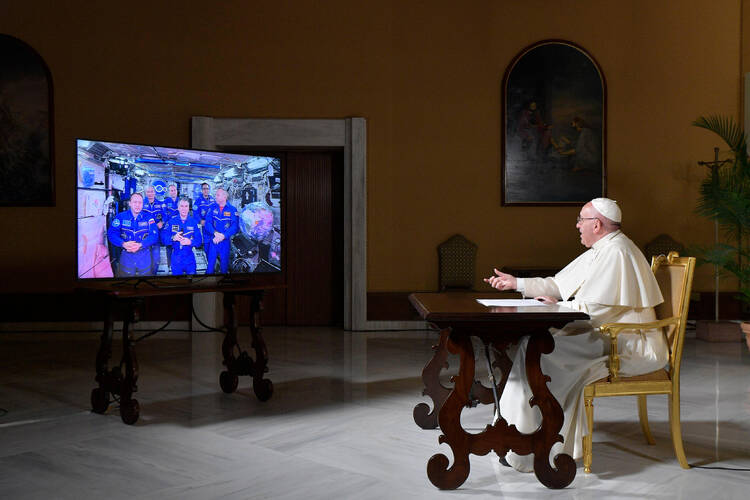VATICAN CITY (AP) — Pope Francis took a small step toward improved Vatican-Russian relations Thursday when he chatted with Russian cosmonauts and praised their understanding of love during a call with the International Space Station.
Italian astronaut Paolo Nespoli played translator during the roughly 20-minute call that was interrupted once when the line dropped at the orbiting laboratory.
Like a curious child, Francis peppered Nespoli and the five other crew members with questions both simple — What inspired them to be astronauts? — and philosophical — How do they view mankind's place in the universe?
Like a curious child, Pope Francis asked: What inspired them to be astronauts? How do they view mankind's place in the universe?
The responses he received, in particular from Russian cosmonauts Alexander Misurkin and Sergey Ryazanskiy, marked another small step for the Vatican's long tense relations with Orthodox Russia. Francis has made improving those ties a priority of his pontificate, and became the first pope in a millennium to meet with the Russian Orthodox patriarch last year.
Ryazanskiy told Francis that he had been inspired by his grandfather, a Soviet engineer who helped build Sputnik, the world's first artificial satellite that marked the beginning of the Space Age.
"For me it is a great honor to continue what he was doing to fulfill his dreams with a space flight, the future of all humanity," Ryazanskiy told the pope in English.
Francis, who has long exalted the role of grandparents, marveled at his response. "That's our strength: Never forget roots. It does me good to hear this! Thank you," Francis said.
Francis also praised Russian cosmonaut Alexander Misurkin: Francis had asked how the crew members understood Dante's verse that love is the force that moves the universe.
Misurkin told him in Russian, translated by Nespoli, that he had been reading Antoine de St. Exupery's "The Little Prince" while in space and was taken by the young prince's understanding of love.
"Love is the force that gives you strength to give your life for someone else," he told the pope.
Francis lit up at his response, saying "It's clear you have understood the message that St. Exupery so poetically explained, and that you Russians have in your blood, in your humanistic and religious tradition."
It was the second papal phone call to space: Pope Benedict XVI rang the space station in 2011 and asked about the future of the planet and the environmental risks it faced. Before Benedict, Pope Paul VI sent a radio message to astronauts Neil Armstrong, Edwin Aldrin and Michael Collins after their historic 1969 moonwalk, calling them "conquerors of the Moon."
Francis, who considered a career as a chemist before becoming a priest, has repeatedly expressed his concern for the environment and care for what he calls "our common home."
Space station Cmdr. Randy Bresnik told Francis that what he most enjoyed in space was being able to "see God's creation maybe a little bit from his perspective."
"You see the thinness of the atmosphere, it makes you realize how fragile our existence here is," he added.
Italian astronaut to Pope Francis: "You took us away from the daily mechanics of things and made us think about things that are bigger than us."
Bresnik, a U.S. Marine who flew combat missions during the Iraq war, told Francis that what struck him most was that from space there are "no borders, there is no conflict, it's just peaceful."
"People cannot come up here and see the indescribable beauty of our Earth and not be touched in their souls," he told the pope.
Nespoli thanked Francis for his philosophical questions, telling him that most of the crew's days are spent performing highly technical and mechanical tasks."You brought us higher up," he said. "You took us away from the daily mechanics of things and made us think about things that are bigger than us."











